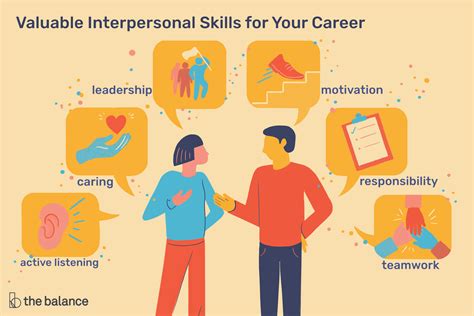Essential Interpersonal Skills Employers Value

Interpersonal skills, also known as soft skills or people skills, are the abilities that allow individuals to communicate, collaborate, and interact effectively with others. These skills are essential for success in the workplace, as they enable individuals to build relationships, resolve conflicts, and work well in a team. In this article, we will discuss the essential interpersonal skills that employers value and how to develop them.
1. Communication
Effective communication is the foundation of good interpersonal skills. It involves the ability to convey information clearly and accurately, listen actively, and respond appropriately. Communication skills are crucial in the workplace, as they help individuals to build relationships with colleagues, clients, and customers.
- Active Listening: Listening actively involves giving your full attention to the speaker, asking clarifying questions, and summarizing what you have heard. This ensures that you understand the speaker’s message and can respond appropriately.
- Clear and Concise Communication: Clear and concise communication involves using simple language, avoiding jargon, and being direct in your message. This ensures that your message is understood by the recipient.
- Empathy: Empathy involves understanding and sharing the feelings of others. This helps individuals to build rapport and trust with others, and to respond appropriately to their needs.
2. Teamwork
Teamwork involves working collaboratively with others towards a common goal. It involves sharing ideas, supporting others, and being open to feedback. Teamwork is essential in the workplace, as it enables individuals to achieve more than they could on their own.
- Collaboration: Collaboration involves working with others to achieve a common goal. It involves sharing ideas, supporting others, and being open to feedback. Collaboration helps individuals to achieve more than they could on their own.
- Conflict Resolution: Conflict resolution involves the ability to resolve disagreements or conflicts in a constructive manner. It involves listening to others, finding common ground, and working towards a mutually beneficial solution.
- Flexibility: Flexibility involves being open to change and adapting to new situations. It involves being able to work in different roles or with different people, and being willing to learn new skills.
3. Leadership
Leadership involves the ability to inspire and motivate others towards a common goal. It involves setting a vision, communicating effectively, and providing guidance and support. Leadership is essential in the workplace, as it enables individuals to inspire and motivate others towards achieving a common goal.
- Vision: A vision involves setting a clear and compelling goal that inspires and motivates others. It involves communicating the vision effectively, and providing guidance and support to achieve it.
- Communication: Communication involves the ability to convey information clearly and effectively. It involves listening actively, providing feedback, and being open to input from others.
- Support: Support involves providing guidance, resources, and encouragement to help others achieve their goals. It involves being available to answer questions, provide feedback, and offer assistance when needed.
4. Adaptability
Adaptability involves the ability to adjust to new situations and changes in the workplace. It involves being able to learn new skills, work in different roles or with different people, and respond to new challenges.
- Learning: Learning involves the ability to acquire new knowledge and skills. It involves being open to new ideas, seeking out feedback, and continuously improving.
- Flexibility: Flexibility involves being open to change and adapting to new situations. It involves being able to work in different roles or with different people, and being willing to learn new skills.
- Problem-Solving: Problem-solving involves the ability to identify and solve problems in a creative and effective manner. It involves analyzing the situation, considering different options, and implementing a solution.
5. Emotional Intelligence
Emotional intelligence involves the ability to understand and manage your own emotions, as well as the emotions of others. It involves being able to empathize with others, regulate your own emotions, and respond appropriately to the emotions of others.
- Self-Awareness: Self-awareness involves the ability to recognize and understand your own emotions. It involves being able to identify your strengths and weaknesses, and to use this knowledge to improve your interactions with others.
- Empathy: Empathy involves understanding and sharing the feelings of others. This helps individuals to build rapport and trust with others, and to respond appropriately to their needs.
- Conflict Resolution: Conflict resolution involves the ability to resolve disagreements or conflicts in a constructive manner. It involves listening to others, finding common ground, and working towards a mutually beneficial solution.
Conclusion
Interpersonal skills are essential for success in the workplace. By developing these skills, individuals can communicate effectively, work well in a team, and inspire and motivate others towards a common goal. Employers value these skills, as they enable individuals to build relationships, resolve conflicts, and achieve more than they could on their own.
FAQs
-
What are interpersonal skills?
Interpersonal skills, also known as soft skills or people skills, are the abilities that allow individuals to communicate, collaborate, and interact effectively with others.
-
Why are interpersonal skills important?
Interpersonal skills are important in the workplace, as they enable individuals to build relationships, resolve conflicts, and work well in a team.
-
What are some examples of interpersonal skills?
Examples of interpersonal skills include communication, teamwork, leadership, adaptability, and emotional intelligence.
-
How can I develop my interpersonal skills?
You can develop your interpersonal skills by practicing active listening, collaborating with others, setting a vision, being open to change, and being empathetic.
-
How do employers assess interpersonal skills?
Employers assess interpersonal skills through interviews, assessments, and observations of how individuals interact with others in the workplace.
